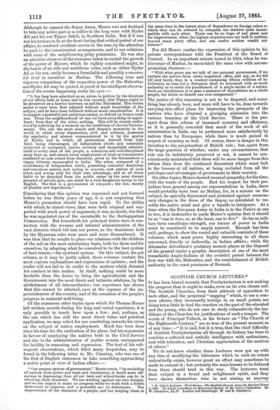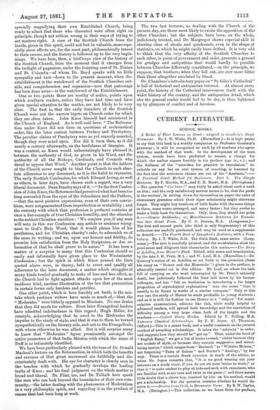SCOTTISH CHURCH LECTURES.*
IT has been hinted recently that Presbyterianism is not making the progress that it ought to make, even on its own chosen soil. The Scottish Churches, from their attitude of opposition to each other, and the perpetual " nagging " which, to use a com- mon phrase, they incessantly indulge in on small points, are doing not a little to feed the reaction on the part of the educated and the young, who do not care to study exhaustively the tra- ditions of the Churches for justifications of such a temper. The words of Principal Tulloch, in his lecture on " The Church of the Eighteenth Century," are as true of the present moment as of any time :—" It is said, but it is true, that the chief difficulty of Scottish Presbyterianism all through its history has been to
• a cultured and catholic intelligence with enthusiasm, zeal with toleration, and Christian appreciation of the motives of others."
We do not know whether these Lectures were got up with any idea of modifying the bitterness which to such an extent undoubtedly exists, however great an effort may sometimes be made to conceal it ; but certainly the main lessons to be deduced from them should tend in this way. The lecturers treat their subject in a broad and enlightened spirit, and they have shown themselves wise in not aiming at anyway
• St. Giles's Lectures : First Series,—The Scottish Church, from the Earliest Times to 1881. To which is prefixed an Historical Sketch of St. Giles's Cathedral. By W. Chambers, LL.D. London and Edinburgh o W. and Chambers.
specially magnifying their own Established Church, being ready to admit that those who dissented were often right on principle, though not seldom wrong in their ways of trying to set matters right. A view of the Scottish Church from the inside, given in this spirit, could not but be valuable, more espe- cially since effects are, for the most part, philosophically traced to their causes, and the history is followed up to the very begin- nings. We have here, then, a bird's-eye view of the history of the Scottish Church, from the moment that it emerges from the twilight of paganism, under the fostering care of St. Ninian and St. Columba—of whom Dr. Boyd speaks with no little sympathy and tact—down to the present moment, when dis- establishment is the watchword of the Scottish Churches out- side, and comprehension and expansion—now that patronage has been done away—is the watchword of the Establishment.
One or two points there are worthy of notice, points upon which southern readers, unless they have had time and have given special attention to the matter, are not likely to be very clear. The first is, that the early founders of the Scottish Church were not the narrow bigots on Church order for which they are often taken. John Knox himself had ministered in the Church of England. As is well said here, "The Reforma- tion under Knox did not turn on questions of ecclesiastical order, like the later contest between Prelacy and Presbytery. The peculiar claims of Presbytery were as yet scarcely asserted, though they were acted upon. Nor did it turn then, as it did nearly a century afterwards, on the lawfulness of liturgies. It was a contest, as Knox would unhesitatingly have phrased it, between the authority of God, as given in his Word, and the authority of all the Bishops, Cardinals, and Councils who dared to oppose that Word." Another point is that the fathers of the Church never sought to bind the Church to such abso- lute adherence to any document, as it is the habit to represent. The early Scottish Confession, for which Edward Irving, as well as others, in later days, have shown such a regard, was a very liberal document. Dean Stanley says of it :—" In the first Confes- sion of John Knox, the Reformers had perceived what had been too long concealed from the eyes of the Schoolmen and the Fathers, —that the most positive expressions, even of their own convic- tions, were notguaranteed from imperfection or mutability ; and the entreaty with which that profession is prefaced contains at once a fine example of true Christian humility, and the stimulus to the noblest Christian ambition : We conjure you, if any man will note in this our Confession any article or sentence repug- nant to God's Holy Word, that it would please him of his gentleness, and for Christian charity's sake, to admonish us of the same in writing ; and we, upon oar honour and fidelity, do promise him satisfaction from the Holy Scriptures, or due re- formation of that he shall prove to be amiss. " It has been a matter of a surprise to many that this Confession should so easily and informally have given place to the Westminster Confession ; but the spirit in which Knox penned the lines quoted above were, in theory, held to cover and qualify all adherence to the later document, a matter which struggles of many kinds tended gradually to make of less and less effect, as the Church had to fight against attacks upon her of the most insidious kind, another illustration of the law that persecution in certain forms only hardens and petrifies.
One other point, which is here forcibly set forth, is the mis- take which partisan writers have made so much of,—that the ." Moderates " were bitterly opposed to Missions. No one denies that they did much for culture. Even later Evangelical leaders have admitted indebtedness in this regard; Hugh Miller, for example, acknowledging that he owed to the Moderates the impulse to the study of style, and that it was to them he turned sympathetically on the literary side, and not to the Evangelicals, with whom otherwise he was allied. But it will surprise many to know that " Moderates " figure prominently amongst the active promoters of that India Mission with which the name of Duff is so intimately identified.
We have been particularly pleased with the tone of Dr. Donald Macleod's lecture on the Reformation, in which both the benefits and excesses of that great movement are faithfully and dis- criminately dealt with. His eye for character is clearly seen in the touches with which he gradually develops the leading traits of Knox ; and his final judgment on the whole matter is broad and liberal. Dr. Flint, too, and Dr. Tulloch here speak like men who can look beyond the boundaries of their own corn. munity,—the latter dealing with the phenomena of Moderatism in a very philosophic spirit, and regarding it as the product of causes that had been long at work. The two last lectures, as dealing with the Church of the present day, are those most likely to excite the opposition of the other Churches ; but the subjects have been, on the whole, judiciously treated, and Dr. Macgregor shows especial skill in steering clear of shoals and quicksands, even in the shape of statistics, on which he might easily have drifted. It is very odd to think that the very affinity of the Scottish Churches to each other, in point of government and order, presents a ground for grudges and antipathies that would hardly be possible between Churches differently constituted,—on the principle, we suppose, that brothers, when they fall out, are ever more bitter than those altogether unrelated by blood.
Dr. Chambers's introductory paper on" St. Giles's Cathedral" is full of historical and antiquarian interest. At almost every point, the history of the Cathedral interweaves itself with the wider history of the country, and the antiquarian detail, which else the general reader would feel to be dry, is thus lightened up by glimpses of conflict and of heroism.































 Previous page
Previous page